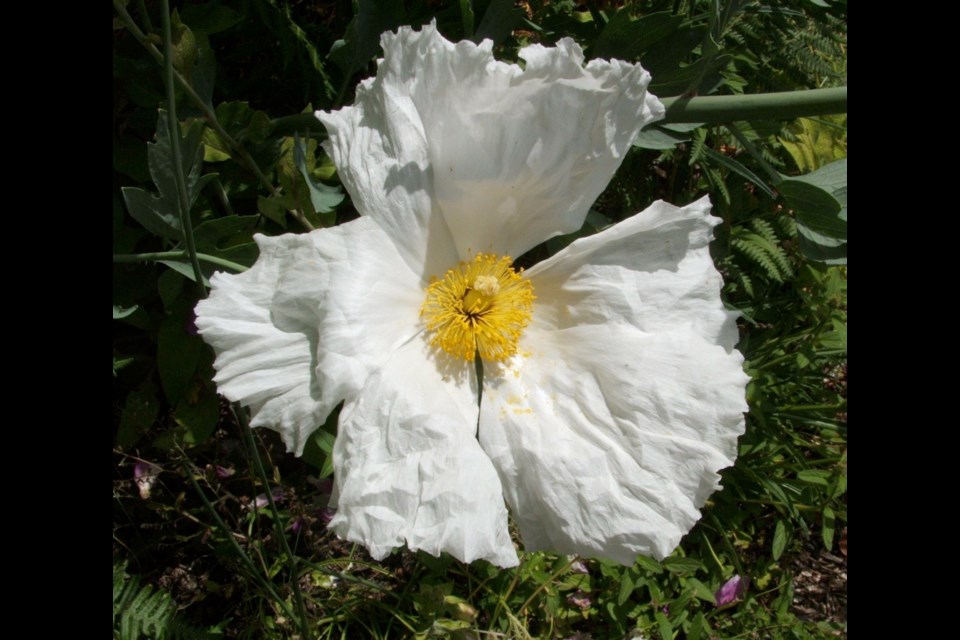Dear Helen: A California tree poppy (Romneya) that has been in the garden for around six years decided to expand its horizons this year. Two small plants appeared mysteriously, several metres from the parent plant. Is this an oddity, or a characteristic of the plant?
P.M.
These shrubby Californian perennials, also known as Matilija poppy (Romney coulteri) are loved for their large, crinkly-petaled, poppy-like flowers with fluffy golden centres. Once well established in a garden, they can become fairly aggressive spreaders via underground rhizomes.
My plant has done this, popping up on the opposite side of a wide pathway and in places ever farther away. I once heard from a gardener whose Romneya managed to travel underneath a garage to produce a new plant by the far wall. So far, I’ve not found it a problem to remove offshoot plants where they are not wanted.
Dear Helen: When my fall lettuce plants began wilting, even though the weather was cool, I pulled some up to find masses of insects on the roots. The insects are coated with a pale, whitish, fluffy substance. I’m calling them root aphids. Am I right? The lettuces are in pots, in re-used soil.
J.H.
You are right. These are lettuce root aphids. I had them only once, long ago, on some lettuces. A sign of their presence is wilting, even in cool conditions, and the heads fail to develop properly.
These aphids gather in clustered colonies on the roots and are covered with a white powdery wax. A mass of whitish, woolly matter can be present along with the aphids. Winged adults develop that can spread from place to place. They overwinter in the egg stage.
Get rid of the lettuces and the soil. Use only fresh planting mix next year. In the open garden, dig the soil deeply and allow it to dry out well before planting lettuce. Keep moving the planting site for each batch of transplants or seeds.
My one experience with root aphids on lettuce was never repeated. infestations are not common in home gardens.
Dear Helen: My mature hydrangea was infested with scale this past summer. I removed many affected leaves, but still many remained on the branches. Is there a way to deal with this problem without using environmentally harmful insecticides?
B.C.
Scale insects are notoriously hard to control. Mature scales are protected by a waxy coating from the effects of sprays, though an insecticidal soap spray can control the immature stage of the insect. Adult scales are oval and brown. Newly hatched crawlers are very tiny and hard to see.
Scale insects are mainly a pest of house and greenhouse plants. On outdoor plants, their numbers are usually kept down by low winter temperatures and natural enemies like lady beetles.
When a significant infestation is observed, it is recommended to prune out branches with the most major infestations. Scales can also be removed from leaves with a soft cloth and soapy water, followed by a clear water rinse. A soft brush or fingernail can be used to remove scales from twigs.
Follow pruning and any hand cleaning you are able to do with an insecticidal soap spray, covering leaves and stems thoroughly. Early summer is the most usual time for the vulnerable crawlers to be out on the plant. Always test a spray first on an inconspicuous part of a hydrangea, and check for any damage after 48 hours.
Drought-stressed plants are most susceptible to scale infestations. In dry weather keep the shrub adequately watered. A nourishing, moisture-retaining mulch as the weather warms in spring is helpful. Avoid over-fertilizing with nitrogen, which promotes the soft, lush growth that is attractive to sap-sucking insects like scales and aphids.
GARDEN EVENTS
Native plants. The Native Plant Study Group will meet on Thursday, Oct. 17, at 7 p.m. in Room A121 of UVic's Cornett Building. Use Parking Lot #4. Naturalist Agnes Lynn will give a presentation on the Subalpine Wildflowers on Hurricane Hill in the Olympic National Park in Washington, with a showing of the flowers to be seen along the trail to the peak. Non-member drop-in by donation. Students free. Yearly membership fee is $25. Cost of parking $3.50. npsg.ca.
Bulbs to plant now. Dinter Nursery, 2205 Phipps Rd. in Duncan, is offering a free, drop-in seminar on Fall Bulbs for Spring Colour on Saturday, Oct. 19. at 10 a.m. Sam Van Noort of Van Noort Bulb Company, a major wholesale supplier of bulbs to local garden centres, will discuss how to plan and plant now for stunning spring colour. dinternursery.ca.



